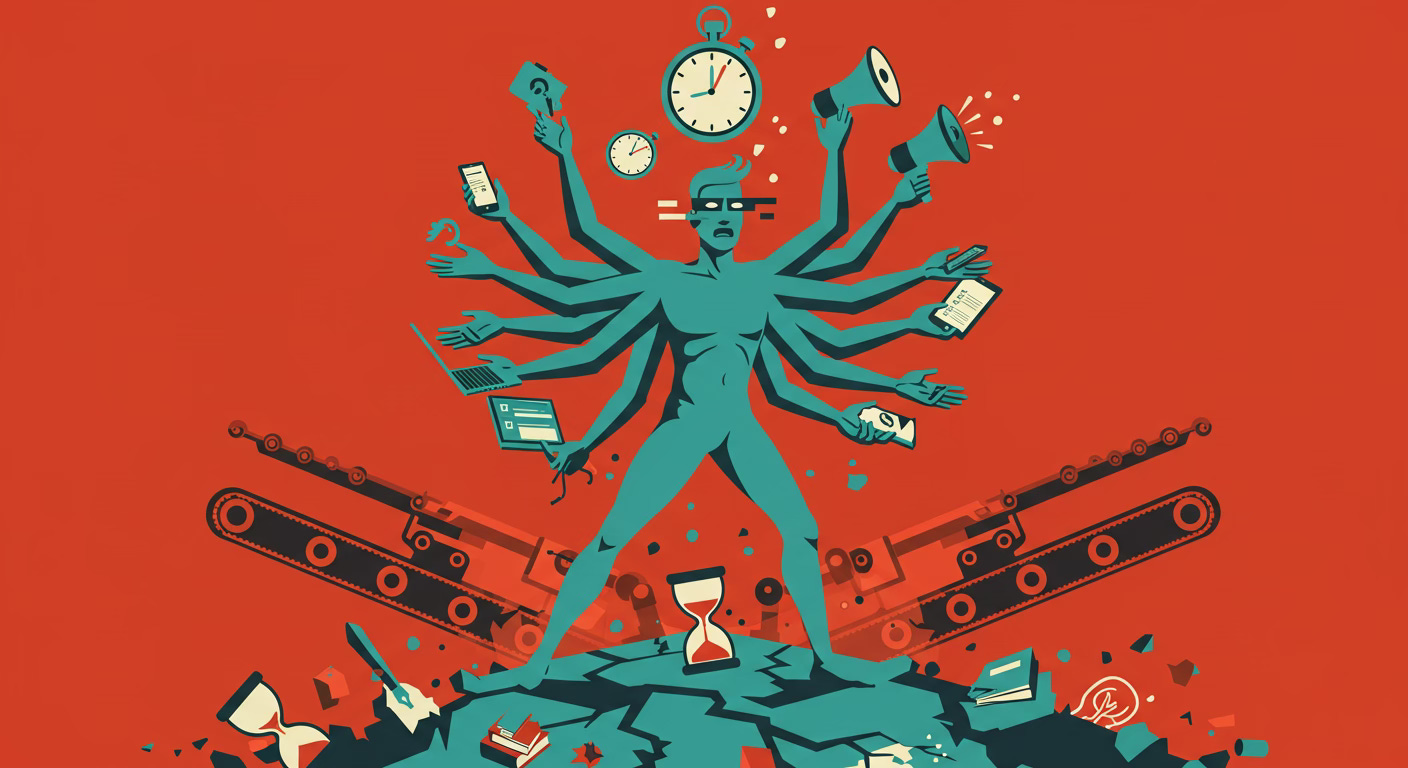The Myth of Multitasking: Who Does Everything, Does Nothing!
A Critique of the Modern Mind’s Surrender to Superficial Speed
In an age where attention is the most contested currency, multitasking has been glorified as a sign of adaptability, intelligence, and productivity. Corporate jargon, self-help literature, and even job descriptions frequently praise the multitasker—the one who can “juggle priorities,” “wear multiple hats,” and “do it all.” Yet beneath this surface-level admiration lies a cognitive mirage. What we call multitasking is more often the illusion of simultaneous engagement, masking a deeper decline in the quality of our thought.
Contrary to popular belief, the human mind is not designed to perform several demanding tasks at once. Numerous studies in cognitive neuroscience affirm that what we label "multitasking" is actually rapid task-switching—moving attention back and forth between tasks, incurring cognitive costs each time. The brain must recalibrate context, reassemble focus, and retrieve the thread of the previous activity. This fragmentation leads to what researchers term "attention residue," where part of our mental bandwidth remains entangled with the previous task, diluting the present.
Far from increasing efficiency, multitasking often results in errors, superficial comprehension, and delayed completion. A person responding to emails while attending a virtual meeting, for instance, might achieve neither task fully. They nod at the screen without truly absorbing the conversation, then write emails peppered with vague formulations and missed attachments. The irony is that multitasking, intended to amplify output, frequently lowers the standard of execution across the board.
But beyond efficiency, multitasking impoverishes something more profound: the inner quality of thought. Deep thinking requires immersion. It demands mental stillness, slowness, and time to let thoughts ripen. Fragmented attention disrupts this gestation. When we toggle between a podcast, a group chat, and a news article, the mind remains stuck in shallow waters, incapable of diving into the depth where insight waits.
Philosopher Simone Weil warned, “Attention is the rarest and purest form of generosity.” In a distracted age, attention becomes revolutionary. To sit with a single thought, to read a text with patience, to listen wholly to another person—these are no longer defaults but deliberate acts of resistance. Multitasking, in contrast, commodifies attention. It spreads the mind thin across multiple surfaces until it loses its ability to concentrate, question, and understand.
There is also a psychological toll. Multitasking creates a permanent state of partial engagement. We are always slightly elsewhere. Conversations with friends are peppered with glances at notifications. Meals are eaten with half an eye on the screen. Reading becomes scanning; listening becomes hearing; thinking becomes reacting. Over time, this trains the mind to expect stimulation at all times and erodes its capacity for silence, boredom, and sustained reflection.
This restlessness carries existential implications. The multitasking mind is not only cognitively fragmented but existentially dislocated. It loses the ability to inhabit the present moment in full. As a result, our lived experiences become blurred, shallow, and poorly stored in memory. We may have spent the afternoon “doing a lot,” yet recall nothing meaningful by evening. Productivity becomes a substitute for presence; motion replaces meaning.
Digital interfaces amplify this problem. Each new tab opened is a new potential self we inhabit briefly before darting elsewhere. A world where one can check the stock market, reply to a message, and scroll through photos of a wedding on three separate tabs creates a rhythm of mental hopping that simulates engagement but leaves no residue of deep reflection. The user is active, but the soul is dormant.
We must ask: at what cost do we allow this multiplicity? To be everywhere at once is often to be nowhere fully. In ancient philosophy, thinkers would speak of “contemplation” as the highest form of human activity—where the soul communes with truth in stillness. Today, even our meditation apps come with notifications and trackers, gamifying inner peace into digital dopamine.
Furthermore, this culture of multitasking breeds an anxiety of incompletion. Since every task is touched only partially, we live in a constant state of open loops. Unsent emails, unread tabs, unspoken responses—all hang like cognitive smog. This perpetual unfinishedness creates low-grade mental exhaustion, felt as a fog that obscures clarity, intention, and satisfaction.
Ironically, the glorification of multitasking also flattens creativity. Creativity is born in slowness, in allowing disparate ideas to coalesce organically over time. Multitasking disrupts the unconscious incubation that insight demands. The writer who checks Twitter every few sentences interrupts the fragile momentum of thought. The programmer who codes while listening to loud music may generate output but not innovation.
A compelling metaphor comes from the culinary arts. A dish that simmers slowly over hours accumulates complexity and richness that flash-fried meals cannot mimic. So it is with thinking. Depth, nuance, and originality come not from acceleration but from stillness, patience, and undivided attention. Multitasking robs the mind of this slow-cooked wisdom.
Philosopher Byung-Chul Han argued that modern society is moving from a disciplinary culture to an achievement-oriented one, where individuals are self-exploiters in the name of performance. Multitasking becomes not a liberation but a form of internalized control—we fragment ourselves to meet the demands of hyper-efficiency, only to feel more empty and less alive.
The antidote lies in the cultivation of mono-tasking—a conscious practice of singular attention. Read one book without checking your phone. Write a paragraph without toggling tabs. Walk without headphones. Think one thought through to the end. Such simplicity might feel countercultural, even radical. But it is through these acts of mental sovereignty that we reclaim our depth.
In the end, a mind scattered across too many tasks becomes estranged from itself. What is lost is not just productivity but identity. We forget what it means to think deeply, to follow a thought down its winding path, to encounter silence not as emptiness but as the space where meaning emerges. True thinking is a monologue with eternity—not a sprint across browser tabs.

